Homemade Laundry Soap Recipe for Eco-Friendly Cleaning
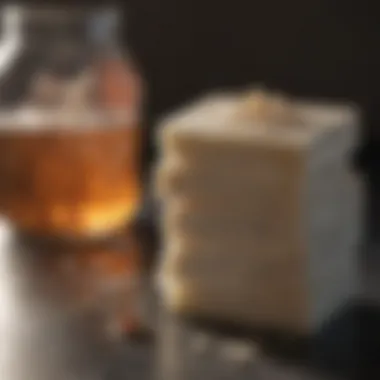

Intro
In an era where sustainability and cost-effectiveness take center stage, the idea of crafting your own laundry soap at home is becoming more than just a trend; it’s a wise decision that many are embracing. This guide aims to delve into the various recipes, the essential ingredients required, and effective methods for creating homemade laundry detergent that not only gets your clothes clean but also keeps your conscience clear.
Why Homemade Laundry Soap?
The benefits of making your own laundry soap are numerous. Not only can you save a pretty penny, but you can also ensure that the ingredients are safe for both your family and the environment. Homemade alternatives often come without the harsh chemicals found in many commercial products. Getting down to brass tacks, this approach is not just about frugality; it's about making a lifestyle choice that aligns with eco-conscious values.
"Making your own laundry detergent is like taking the reins of your household’s chemistry. You control what goes in and what stays out."
As you journey through this guide, you will discover simple recipes, essential tips for preparation, and methods to enhance the effectiveness of your homemade soap. Whether you’re a seasoned pro or a curious novice, there's something valuable here for everyone.
Prelude to Homemade Laundry Soap
Homemade laundry soap isn't just a trendy topic floating around the eco-conscious community; it’s a topic that touches on myriad aspects of daily life, giving homeowners a chance to take control of what goes into their cleaning regimen. In a world where store-bought detergents can often contain a laundry list of unknown chemicals and fragrances, crafting your own soap allows for not only a more transparent and customizable approach but also a dive into sustainability and cost savings that really resonate during tough economic times.
Why Consider Homemade Laundry Soap?
When you think about it, laundry is a never-ending chore. Finding a way to make that less burdensome while also considering the ingredients you’re using? That’s where homemade soap shines. Families can monitor exactly what goes into their soap, creating formulas that suit their needs and concerns. For instance, making soap using natural ingredients such as soap flakes or essential oils means you’re dodging potential irritants that might affect sensitive skin, particularly for children or individuals with allergies.
Moreover, the economic advantages speak volumes. A batch of homemade laundry soap can last significantly longer than commercial products, with simple ingredients that can often be bought in bulk. The ability to whip up a new batch in minutes can ease the financial pinch that many households feel when faced with expensive commercial options. Cost-effective solutions often lead to greater consciousness about spending.
Environmental and Health Considerations
Incorporating homemade laundry soap into your routine doesn’t just enhance control over your household cleaning products; it also provides an avenue for addressing environmental concerns. Many commercial laundry detergents are packed with phosphates and other harmful agents that can wreak havoc on local ecosystems. Transitioning to homemade options paves the way for reducing your household’s carbon footprint and minimizing waste associated with conventional detergent packaging.
Beyond the ecological impact, the importance of health shouldn't be overlooked. Families are increasingly wise to the potential side effects of using chemical-laden products. As a result, making laundry soap from scratch can be a safer alternative, especially for those with allergies or skin sensibilities. Thus, the act of preparing your laundry soap transforms from a mundane task to a proactive measure for health and wellness.
Closing Thoughts
By opting for homemade laundry soap, you’re embarking on a meaningful journey that intertwines financial savvy, environmental awareness, and personal health—elements that increasingly resonate with conscientious homeowners today. It's about being part of a solution that offers choices that truly matter, paving the way to not just cleaner clothes but a cleaner conscience too.
Benefits of Homemade Laundry Soap
When it comes to laundry, the choice between homemade and store-bought soap can feel like a bit of a toss-up. However, diving into the world of homemade laundry solutions presents notable benefits that stick out like a sore thumb. This section aims to clarify why making your own laundry soap not only saves money but also creates a cleaner environment and gives you control over what goes into your soap. Let's break this down further.
Cost-effectiveness
Saving a buck or two is always a crowd pleaser, right? One of the standout advantages of homemade laundry soap is its cost-effectiveness. The ingredients required for homemade laundry soap can often be found in bulk at local grocery stores. A bag of washing soda or a bar of soap typically costs a fraction of what you might spend on premium commercial detergents. Depending on the recipe you choose, one batch can yield enough soap to last for weeks or even months!
Beyond just the upfront savings, using homemade soap can extend the life of your clothes. When you’re not dumping harsh chemicals into the wash, your fabrics stand a better chance of staying fresh and vibrant instead of fading or wearing thin over time. In the long run, you'll not just save on soap but also reduce the expenses related to replacing worn-out garments, making this choice a penny-pincher's dream.
Environmental Considerations
In today’s eco-conscious world, many of us aspire to make choices that are kinder to our planet. Homemade laundry soap steps up to the plate in this department. When you craft your own detergent, you can skip the toxic chemicals often found in commercial options. Big manufacturers frequently utilize synthetic fragrances and dyes, which can contribute to pollution and harm aquatic life.
Furthermore, many homemade recipes use biodegradable ingredients. Each load of laundry becomes an opportunity to lessen your carbon footprint. A nice perk? Using simple packaging or repurposed containers for storage minimizes waste. Every small action counts — after all, we only get one planet, so why not treat it with a little extra care?
Control Over Ingredients
There’s something to be said about knowing exactly what’s in your laundry soap. Crafting your own detergent gives you the reins to decide every ingredient that goes into the mix. Are you allergic to certain fragrances? Do you want to avoid synthetic additives? Or perhaps you’re on the lookout for more natural components that align with your personal preferences or health concerns? With homemade laundry soap, you can curate your mixture to fit your lifestyle and values.
Worried about sensitive skin? Keep it simple by choosing a soap base free from harsh chemicals. Interested in a sweet scent that doesn’t irritate? Opt for essential oils like lavender or tea tree oil — not only do they smell nice, but they may also have antibacterial properties.
"When you make your own laundry soap, you're not just mixing ingredients; you're taking charge of your health, budget, and the environment all at once."
Essential Ingredients for Homemade Laundry Soap
When venturing into the realm of homemade laundry soap, understanding the essential ingredients is paramount. Each component plays a vital role not only in cleaning but also in the final product's performance and safety. \n From durability to effectiveness, a thoughtfully selected combination of these ingredients enhances the overall laundry experience. Not to mention, the decision to use homemade soap allows you to tailor the formula to meet the unique needs of your household, making the process both personal and environmentally friendly.
Soap Base Options
Bar Soap
Bar soap is perhaps the most straightforward entry point into homemade laundry soap. Known for its solid form, it dissolves during washing, releasing its cleaning agents steadily. A key characteristic of bar soap is its ability to create a rich lather – a visual and sensory cue for many users that cleaning is underway. This kind of soap is also easy to find and typically budget-friendly, making it a popular choice for those just starting with DIY laundry solutions.
However, one unique feature of bar soap is that it often requires grating before it can be mixed with other powdery components. This may seem like an extra step, but grating breaks it down into small pieces that dissolve easily, ensuring its stain-fighting properties are effectively utilized. On the downside, some users might find that homemade soap made from bar soap can leave a slight residue if not rinsed properly during the wash cycle.
Liquid Soap
Liquid soap is another option that comes with its own set of strengths. Its primary appeal lies in its ready-to-use nature. Unlike bar soap, it blends seamlessly with other ingredients, making it less prone to clumping. This characteristic also makes it easy to measure and dispense, which could suit specific washing machines better. Furthermore, liquid soap often boasts a gentler formulation, which can be beneficial for those with sensitive skin.
One significant advantage is its versatility. Liquid soap can often be used in a variety of cleaning applications beyond laundry. However, some users might find that the absence of solid ingredients can lead to a less satisfying cleaning experience, depending on the specific formula used, as it may not produce the same lather that many expect from laundry detergents.
Castile Soap
Castile soap stands out as a highly regarded option for making homemade laundry soap due to its natural origins. Made from vegetable oils, it is biodegradable and often carries an organic certification, making it attractive for eco-conscious households. Castile soap can wonderfully emulsify oils, effectively capturing dirt and grime.
A hallmark feature of Castile soap is its concentrate form, which means a little goes a long way. This can be a cost-effective aspect when compressed into a homemade formula. Despite its advantages, Castile soap may not perform as well on tougher stains if used alone. Thus, it’s often mixed with other ingredients, balancing its mildness with stronger stain fighters.
Washing Soda
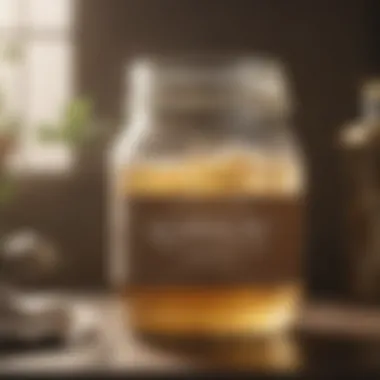
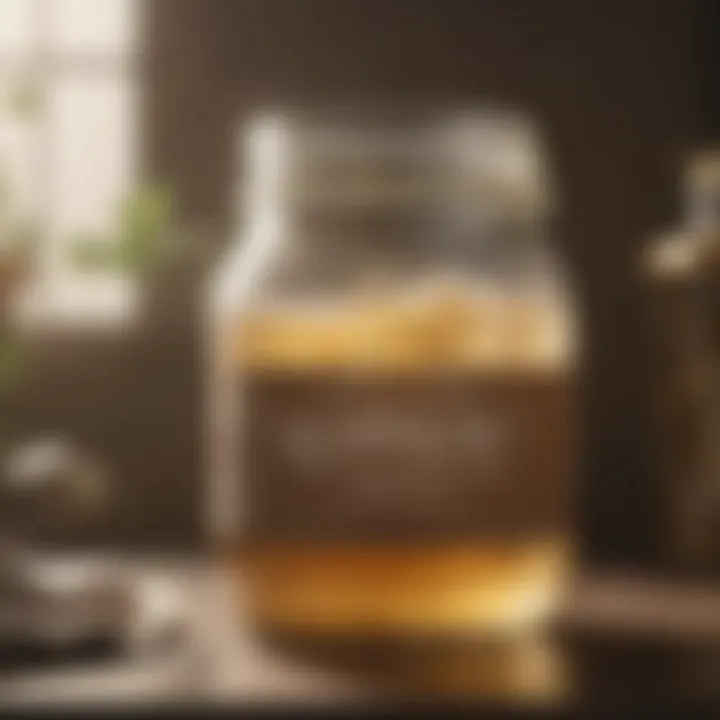
Washing soda, also known as sodium carbonate, is a powerhouse ingredient in homemade laundry soap. It acts as a natural water softener, helping to enhance the effectiveness of other cleaning agents. Many folks find it invaluable since hard water can render detergent less effective. When washing soda is added to laundry soap, it works on a chemical level to break down grease and drive out stains, leaving your clothes fresher with each wash.
Borax
Borax can often be an unsung hero in the realm of homemade cleaning products. This naturally occurring mineral works wonders as a stain remover and deodorizer. One of its notable benefits is boosting the cleaning power of soap, making it a particularly effective companion in your laundry soap mix. Additionally, borax helps to regulate pH levels in laundry, preventing yellowing in whites and adding a measure of brightness to colored fabrics.
Essential Oils for Fragrance
Lastly, essential oils are an excellent way to personalize your homemade laundry soap. Beyond their delightful scents, which can range from citrusy to soothing lavender, essential oils carry properties that can enhance cleaning. For instance, tea tree oil is recognized for its antibacterial characteristics, while eucalyptus adds freshness and invigorates clothes.
It's essential to use essential oils that are safe for fabrics, as some oils may cause discoloration. Take care to test a small amount on fabrics before committing to a full load, to avoid any unpleasant surprises.
Using homemade laundry soap not only is a great way to lessen your ecological footprint but also allows for control over what your family is exposed to during laundry cycles, reinforcing the importance of being mindful about ingredients.
Simple Recipes for Homemade Laundry Soap
Making your own laundry soap is not just a trendy notion; it embodies a practical approach to household chores. This section will focus on simple recipes that provide effective cleaning solutions at home. These recipes bring convenience and customizability, allowing housewives and homeowners to take charge of what goes into their laundry detergents. Furthermore, opting for homemade laundry soap can result in significant savings, plus there's an undeniable satisfaction in creating something from scratch.
Basic Powdered Laundry Soap
Creating a basic powdered laundry soap is one of the simplest methods available, and the beauty lies in its efficiency. This type of soap works wonders for regular soiling and is especially suited for those who prefer dry products.
Ingredients needed for Basic Powdered Laundry Soap:
- 1 bar of soap (like Fels-Naptha, Ivory, or a gentle castile soap)
- 1 cup of washing soda
- 1 cup of borax
The process is straightforward:
- Start by grating the bar soap using a box grater or a food processor. The smaller the shavings, the quicker they dissolve in the wash.
- Mix the grated soap with washing soda and borax in a bowl until well combined.
- Store the mixture in an airtight container.
This recipe yields enough powder for about 40 loads of laundry. With all natural ingredients, it’s a safe choice for sensitive skin and helps keep your clothes fresh without the harsh chemicals found in some commercial products. Remember to use about 2 tablespoons per load.
Liquid Laundry Soap
If powdered laundry soap doesn’t tickle your fancy, liquid soap is another great alternative. It’s particularly helpful when dealing with tough stains, as it seeps deeper into fabrics. Plus, it works well in both standard and high-efficiency washing machines.
Ingredients for Liquid Laundry Soap:
- 1 bar soap (castile or other natural soap)
- 1 cup of washing soda
- 1 cup of borax
- 4 cups of water (or more for dilution as desired)
To make the liquid version:
- Grate the bar soap finely and mix it with hot water in a large pot, stirring until it melts completely.
- In a separate container, combine washing soda and borax with an additional 6 cups of water, then stir until completely dissolved.
- Once the soap mixture cools, combine both mixtures and stir to ensure an even consistency.
- Let it cool, and then transfer to an old detergent bottle or any suitable storage.
This recipe can produce a gel-like consistency that can be diluted with more water if needed, allowing you to customize for your specific washing machine.
Soap Pod Recipe
For those who prefer convenience, soap pods are an innovative way to measure and use homemade laundry soap. They encapsulate the power of your soap in a single dose, making it a breeze to toss into the washer.
Ingredients needed for Soap Pods:
- 1 cup of powdered laundry soap (from the first recipe)
- 1/2 cup of water
Here’s how to make them:
- In a bowl, mix the powdered laundry soap with water until it forms a thick consistency.
- Pour the mixture into ice cube trays or silicone molds, pressing it down to remove any air pockets.
- Allow them to dry for 24 hours until they harden completely.
Once dried, pop out the pods and store them in a cool place. Each pod is perfect for one load of laundry, delivering ease and simplicity at its best.
In making laundry soap at home, you're not just saving money; you're also actively participating in reducing your environmental footprint.
Preparation Methods for Laundry Soap
When it comes to making your own laundry soap at home, understanding the various preparation methods is key. The right technique can influence not only the effectiveness of your soap but also how easy and enjoyable the process is. You'll want to keep a balance between efficiency and thoroughness. Essentially, the preparation method you choose can enhance the quality of your soap, enabling it to tackle tough stains while being gentle on fabrics. This section dives into two popular methods: grating and mixing, and melting and blending, detailing their benefits and considerations.
Grating and Mixing
One of the simplest and most traditional approaches to make homemade laundry soap is through grating and mixing. This method allows for the effortless integration of a soap base with other dry ingredients like washing soda and borax.
Benefits of this method include:
- Ease of Access: You only need a cheese grater and a bowl. No fancy gadgets are required, making it quite approachable for anyone starting out.
- Control Over Texture: By grating bar soap, you're able to achieve a consistency that dissolves easily in water during laundry cycles.
- Familiarity: For those who like tactile experiences, this method provides a nostalgic vibe, often reminding many of simple culinary tasks.
Steps to Grate and Mix:
- Choose a soap base. A standard bar soap like Zote or Fels-Naptha works well.
- Grate using a cheese grater until you have the desired amount.
- In a large bowl, mix your grated soap with washing soda and borax (use equal parts for efficiency).
- Once blended, store in an airtight container. You might want to label it clearly to avoid confusion with other household items.
This method shines for its efficiency and the straightforward process, making it a favorite among many home enthusiasts.
Melting and Blending
For those looking for a more modern twist, melting and blending could be the way forward. This method involves heating the soap base until it’s liquid, allowing you to mix it more seamlessly with other ingredients.

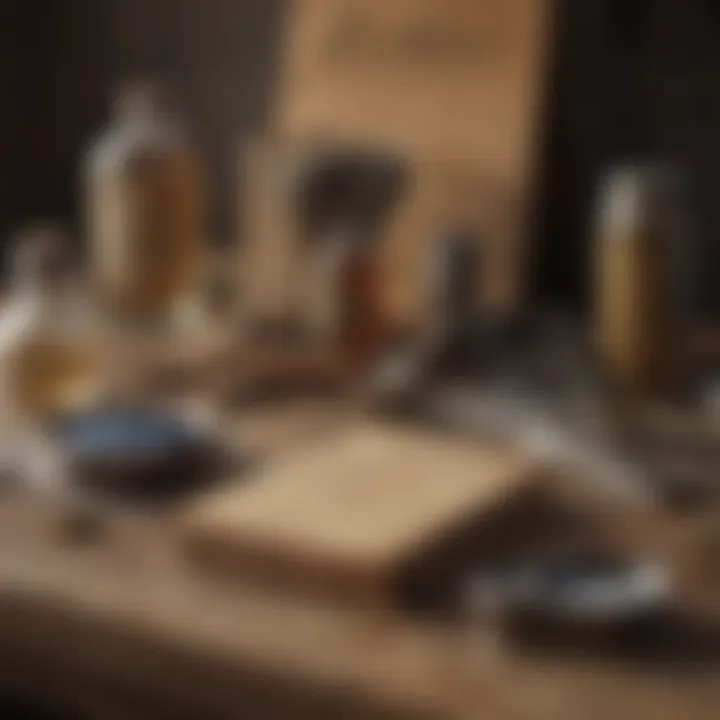
Why choose melting and blending?
- Smooth Consistency: Melted soap can create a clump-free mixture, which can enhance the overall effectiveness during washing.
- Versatility: You can add liquid ingredients or essential oils easily, offering greater flexibility in creating personalized scents or enhancing cleaning properties.
- Uniformity: This method can help achieve a more uniform mixture since the melted soap can bind well with other components.
Steps for Melting and Blending:
- Grate your chosen soap base as in the previous method. This will speed up the melting process.
- Place the grated soap in a saucepan over low heat. Stir periodically until fully melted, being careful not to scorch it.
- Once melted, remove from heat and quickly add washing soda and any desired additives while stirring vigorously.
- Pour the mixture into molds or a container for it to solidify.
In combining these elements, you'll have a homemade laundry soap that is not just eco-friendly but also tailored to your unique needs.
"Choosing the right preparation method for laundry soap can create magic in your washing routine; whether it's grating or melting, the choice is yours to make."
By thoroughly understanding these preparation techniques, you'll be better equipped to craft a laundry soap that meets your family's laundry requirements effectively.
Storing Your Homemade Laundry Soap
After crafting your very own homemade laundry soap, think about how you will store it. Proper storage not only helps to maintain the soap’s effectiveness but also keeps it safe and accessible when you need it. Additionally, proper storage can prolong the life of the soap, ensuring that you get the most bang for your buck. If you let your soap sit in the wrong conditions, it could lose potency or even get contaminated.
Choosing the Right Container
Selecting an appropriate container for your laundry soap is crucial. You need something that is both airtight and durable. Plastic containers work well, especially food-grade buckets or jars, which can be sealed tightly to keep moisture out. Glass jars are stylish and sturdy, but be cautious if there’s a lot of clumsiness in your household. For powdered soap, consider using a container with a wide mouth; it’s much easier to scoop out the soap.
When it comes to dimensions, think about how much soap you’ve made. If you’ve got a large batch, go with a bigger container to avoid overstuffing. Conversely, smaller containers can be handy for storing liquid forms – just ensure your family knows which is which to avoid mix-ups during laundry day.
Labeling and Organizing
Labeling isn’t just about style; it’s about functionality too. Clear labels can save you time—and frustration. Make sure you print or write down the contents clearly. Including the date when you made the soap can also help keep track of its freshness. Use waterproof labels or write with a permanent marker to avoid smudging.
An organized storage system can make laundry day smoother. Keep all your laundry-related items together—detergents, stain removers, and fabric softeners. If you’re feeling particularly organized, a small basket for labels, measuring scoops, and other tools can be quite handy.
Organizing your laundry supplies can save time and effort in the long run. The easier you make it to access your homemade detergent, the more likely you are to use it regularly.
Overall, investing a bit of thought into how you store and label your homemade laundry soap enhances both its longevity and your laundry experience.
How to Use Homemade Laundry Soap
Using homemade laundry soap may seem like a walk in the park, but it involves a few key factors that can make or break your laundry experience. The way you utilize your homemade concoction is just as crucial as the ingredients you pick. Getting it right can enhance cleaning power and ensure your fabrics withstand the test of time.
Measuring the Right Amount
When it comes to homemade laundry soap, one of the most important aspects to consider is measuring the appropriate amount for each load. Too much soap can lead to residue buildup on your fabrics and washing machine, while too little can leave your clothes looking dingy.
- Here’s a guideline to help:
- For regular loads in a standard washing machine, about 1/4 cup to 1/2 cup of powdered or liquid soap is usually sufficient.
- HE (high-efficiency) machines need less, typically around 2 tablespoons.
Finding the sweet spot requires a bit of trial and error. Observe how your clothes feel and smell after washing. If they come out both clean and fresh, you've hit the jackpot.
Compatibility with Washing Machines
Not all laundry soaps are created equal, and your washing machine plays a pivotal role in how effective your homemade soap is. Most modern machines, especially HE machines, are designed for low-sudsing detergents. Luckily, homemade soap can be quite adaptable.
- Front Load Washers: These require less detergent due to their design. Stick to the previously mentioned measurements, and make sure your soap is formulated to produce low suds.
- Top Load Washers: You can use a bit more soap, since these machines agitate differently and generally require a higher volume of detergent to achieve proper cleaning.
Tip: Always check your washing machine’s user manual for specific instructions regarding detergent usage. This can save you a headache down the line.
"A stitch in time saves nine" - ensuring proper measurements and compatibility can save you from laundry woes later.
To sum up, the effective use of homemade laundry soap boils down to two factors: correct measurements and machine compatibility. Mastering these can lead to cleaner clothes and a more efficient washing process, making your homemade endeavor a win-win.
Potential Challenges with Homemade Laundry Soap
Creating homemade laundry soap can be a rewarding endeavor, but it’s not without its hurdles. Understanding the potential challenges beforehand allows you to navigate them smoothly, ensuring your experience is as pleasant as possible. The aim here is to illuminate specific issues that might arise and to provide solutions, empowering you to make informed decisions throughout the process.
Residue Issues
When you start using homemade laundry soap, one common concern is residue left on your clothing or inside the washing machine. This sticky build-up can be a result of various factors, including the type of soap used, the water quality, and even the washing machine settings. Residue isn’t just an aesthetic issue; it affects clothing performance and odor.
Here are a few key points to think about regarding this challenge:
- Soap Type: Some soaps, especially those high in fats, can leave a film. Choosing a quality soap base can help mitigate this problem.
- Water Quality: Hard water can contribute to residue issues. If your water contains high levels of calcium or magnesium, consider using a water softener or increasing the amount of washing soda in your recipe.
- Wash Cycle: Sometimes, using the wrong cycle can cause less agitation, preventing proper rinsing. Adjusting to a longer rinse cycle can help wash away any residues.
"With the right adjustments, residue issues can often be avoided altogether, ensuring your laundry comes out fresh and clean.”
Fading Colors in Fabrics
Another notable challenge that could emerge is the fading of colored fabrics over time. Homemade laundry soap tends to be less commercialized when it comes to preserving the vibrancy of your clothes. Although they are generally gentler, improper formulation or application can lead to unwanted color bleed or fading.
Keep these points in mind:
- Ingredient Sensitivity: Borax, while effective, can sometimes be harsh on colored fabrics. It’s advisable to test your detergent on a small area first.
- Water Temperature: Hot water may be effective for stain removal but can also strip colors. Try using cold water for washing colored items whenever possible.
- Sunlight Exposure: After washing, avoid drying clothes in direct sunlight which can accelerate fading.
Alternatives and Variations
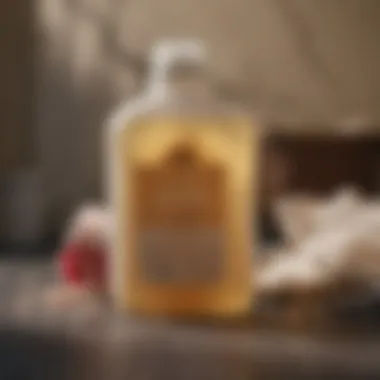
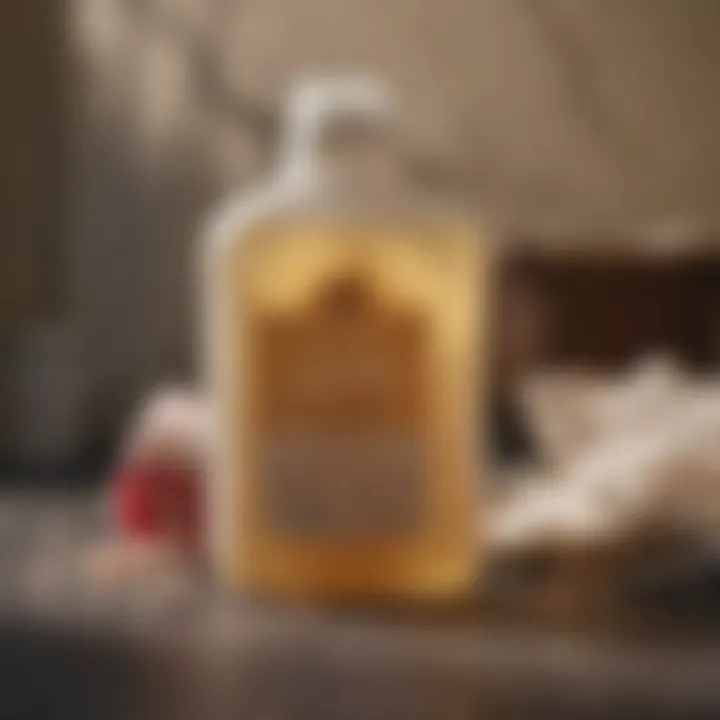
When delving into the realm of homemade laundry soaps, the ebb and flow of creativity knows no bounds. Alternatives and variations in laundry soap not only bolster the effectiveness of your cleaning solution but also tailor it to your personal preferences and needs. Staying flexible allows one to address varying laundry challenges—think stubborn stains, delicate fabrics, or even unique scent preferences—ensuring optimal results with each wash. This section will unpack the many alternatives and variations that can be employed in homemade laundry formulas, ultimately making the entire laundry experience much more satisfying and environmentally friendly.
Common Additives
Oxygen Bleach
A crucial component in many laundry yet often underestimated additive is oxygen bleach. This substance stands as a cleaner and brightener, making it a prime choice for anyone keen on maximizing their laundry's clarity and freshness. Oxygen bleach is typically in powder form and, when mixed with water, releases active oxygen that penetrates fibers to steam away stains and discoloration effectively.
One of the key characteristics of oxygen bleach is its versatility. It can be employed on a range of fabrics and colors. Compared to traditional chlorine bleach, this option does not pose the same risks of fading colors or damaging delicate materials. Many find this to be a favorite in their homemade laundry soap recipes due to its natural stain-fighting prowess.
However, it is not without its caveats. For instance, while it excels at whitening whites, it might struggle with set-in stains on darker fabrics. Therefore, it’s wise to conduct a patch test for compatibility with your favorite items.
Stain Removers
Now, on to stain removers—a very popular additive to homemade laundry soaps. These additives can take various forms, from enzymes to specialized natural substances designed for targeting specific stains like grease, grass, or wine. Stain removers shine in their ability to pre-treat spots, making them an essential ally in the battle against persistent blemishes.
The special feature of many stain removers lies in their targeted approach. For instance, enzyme-based products break down proteins in organic stains, leaving those tough spots in the dust. This characteristic makes them particularly beneficial when dealing with food or bodily fluid stains, which can become embedded over time. Many homemakers swear by these products for their sheer effectiveness in lifting stains that store-bought detergents often fail to tackle.
Nonetheless, reliance on stain removers requires a bit of caution. Some formulations can be particularly potent, and overuse might lead to fabric wear or discoloration if not monitored closely. Therefore, balancing usage according to your laundry's needs is essential.
Vegan and Organic Options
In recent years, the push for more conscious consumerism has bred a vibrant market for vegan and organic laundry soap options. These alternatives tend to shun animal-based ingredients and synthetic additions. Instead, they lean on natural materials that provide a gentler touch while still delivering a formidable cleaning punch.
Choosing vegan and organic alternatives not only speaks to personal beliefs but can also resonate with broader ecological considerations. Many of these options boast biodegradable formulas, making them less harmful to our ecosystems. Additionally, most are free from harsh chemicals, which makes them more suitable for sensitive skin—a consideration that every house owner or housewife will appreciate. Knowing that the laundry soap circulating through your home is devoid of harmful ingredients can bring peace of mind.
In summary, embracing alternatives and variations in homemade laundry soap opens a vast landscape of possibilities. From oxygen bleach and stain removers to vegan and organic options, each element can elevate your laundry experience. Whether striving for effectiveness, eco-friendliness, or simply personal satisfaction, there lies a multitude of pathways to explore in creating a laundry solution that resonates with your values and needs.
Comparing Homemade and Store-Bought Laundry Soap
When discussing the dynamics of laundry care, comparing homemade and store-bought soap emerges as an essential topic. Each option comes with its own set of pros and cons, and evaluating them helps consumers make informed choices. Understanding these differences can save money, improve cleaning efficiency, and reduce environmental footprints.
Cost Comparison
Delving into the cost aspect, homemade laundry soap generally outshines its commercial counterparts. While initial investments might seem high—buying the necessary ingredients like washing soda, borax, and soap base—the long-term savings are where the real comparison lies. Homemade soap can cost as little as a few cents per load, whereas store-bought versions can run several dollars for the same quantity.
"In a year’s time, the savings from making your own laundry detergent can really add up!"
Often, bulk purchasing of ingredients makes it possible to keep producing detergent without significant additional costs. Many households are saving twenty dollars or more each month, which can then be redirected to more pressing matters. Of course, there are premium brands that offer high quality, but when weighing cost and quantity, homemade options can turn out way cheaper.
Effectiveness in Cleaning
The effectiveness of cleaning may vary based on personal preference and specific laundry needs. For example, homemade soap shines on general washing and is very effective for everyday dirt and grime. Many enthusiasts swear by their custom recipes that out-perform commercial detergents in certain scenarios, especially when tackling tough stains without resorting to harsh chemical additives.
However, it's crucial to note that the effectiveness of homemade soap might highly depend on formulation and washing machine types. Some traditional homemade detergents may not fare as well with high-efficiency machines that require low-sudsing products. In these cases, fine-tuning the recipe allows users to find a satisfying balance of cleaning power without unwanted residues.
Environmental Impact Analysis
Environmental considerations heavily factor into the ongoing debate between homemade and store-bought options. Homemade laundry soaps often boast biodegradable and non-toxic ingredients, making them a favorite for environmentally conscious people. Unlike many commercial brands laden with artificial fragrances and harmful fillers, homemade soap typically utilizes plant-based ingredients, reducing the risk of exposing sensitive skin or polluting waterways.
On the flip side, many mass-produced detergents contribute to plastic waste due to their packaging. Opting for homemade options often means less plastic use, contributing to a greater global effort toward environmental sustainability. Each homemade batch can be stored using reusable containers, minimizing waste with each cycle of laundry.
In the end, the analysis of homemade versus store-bought laundry soap involves careful consideration of cost, cleaning effectiveness, and environmental implications. Each point can sway opinions in either direction, depending on individual priorities and values in laundry care.
Common Myths About Homemade Laundry Soap
Misinformation can run rampant when it comes to homemade laundry soap. These myths not only create hesitation in trying these alternatives but also lead to misunderstandings about their effectiveness and safety. Understanding the truth about homemade laundry soap can empower consumers to make informed choices that align with their values—both economically and environmentally. Here, we address some common myths that can cloud the reality of making your own laundry detergent.
Effectiveness Myths
One of the most pervasive myths surrounding homemade laundry soap is that it's ineffective compared to store-bought options. Many folks believe that commercial detergents, with their bright packaging and bold marketing claims, are always superior when it comes to cleaning power. However, this isn’t necessarily true. Homemade soaps can indeed clean clothes effectively, as they often contain powerful ingredients like washing soda and borax. These components work to break down stains and lift dirt, much like many commercial products do.
While individuals might have grown accustomed to store-bought detergents, the feel-good factor of creating something from scratch plays a role too. Take a moment to consider this: many people have been using homemade soap for generations. Before commercial laundry detergents took over the shelves, families relied on simple recipes passed down through time.
"Many homemade soaps can match the cleaning action of their commercial counterparts without the harsh chemicals."
When making your own soap, the ingredient quality can be controlled too, so you can tailor it specifically to your needs. It’s essential to remember that the perceived cleaning prowess of a store brand is often tied to its marketing, rather than innate superiority.
Safety Myths
Alongside effectiveness, safety is another area where misconceptions abound. Some critics claim that homemade laundry soaps are unsafe, filled with caustic ingredients that pose health risks. However, it’s crucial to understand the ingredients used in homemade recipes. For example, while borax has faced scrutiny, it is, in fact, a naturally occurring mineral. When used in moderate amounts, it’s generally considered safe for laundry applications.
Furthermore, the ability to control ingredients means that one can avoid artificial fragrances, dyes, and other additives found in many commercial detergents that can aggravate skin sensitivities. A personalized approach allows users to opt for natural alternatives, like essential oils, which might even enhance safety and reduce allergy concerns.
By debunking these safety myths, we pave the way for a more informed understanding of homemade laundry soap. With proper knowledge and preparation, it can be a safe, economical, and effective choice for maintaining your laundry.
Culmination: The Case for Homemade Laundry Soap
As we find ourselves navigating the complexities of modern life, the notion of creating homemade laundry soap rings truer than ever. The benefits of embracing this practice not only cater to personal needs but also resonate with broader environmental and economic considerations, making it an engaging alternative to store-bought products.
Cost Savings is a significant factor. When you roll up your sleeves and create your own laundry soap, you’re not just saving a few coins; you’re building a habit that nurtures both your household budget and your ingenuity. Many people don’t realize how expensive commercial laundry detergents have become. By concocting your detergent at home, you'll likely notice that your monthly expenses take a nosedive. You can mix and match your ingredients based on sales or what you have on hand, effectively managing costs without compromising on quality.
Environmental impacts can't be ignored either. Each time we opt for homemade soap, we are reducing plastic waste and eliminating unnecessary chemicals that often find their way into our water supply. The use of easily biodegradable ingredients lessens the ecological footprint, contributing positively to the fate of the planet. It’s like casting a vote for sustainability with every load of laundry you do.
Another hidden gem in this endeavor is the control over ingredients. With a homemade approach, you don't just know what’s going into your laundry soap. You have the power to tweak recipes, ensuring they align with your values—be it avoiding allergens, harmful chemicals, or synthetic fragrances. By doing this, you create a peace of mind that store brands often don’t offer.
To wrap up, embracing homemade laundry soap isn’t merely about saving a buck or two; it’s a lifestyle choice that offers significant value. This decision mirrors a shift towards mindful consumption. It reaffirms not just resourcefulness but fosters a deeper connection with our everyday lives.
"Every little bit helps, and turning to homemade options might be that spark we all need to fuel broader change."



